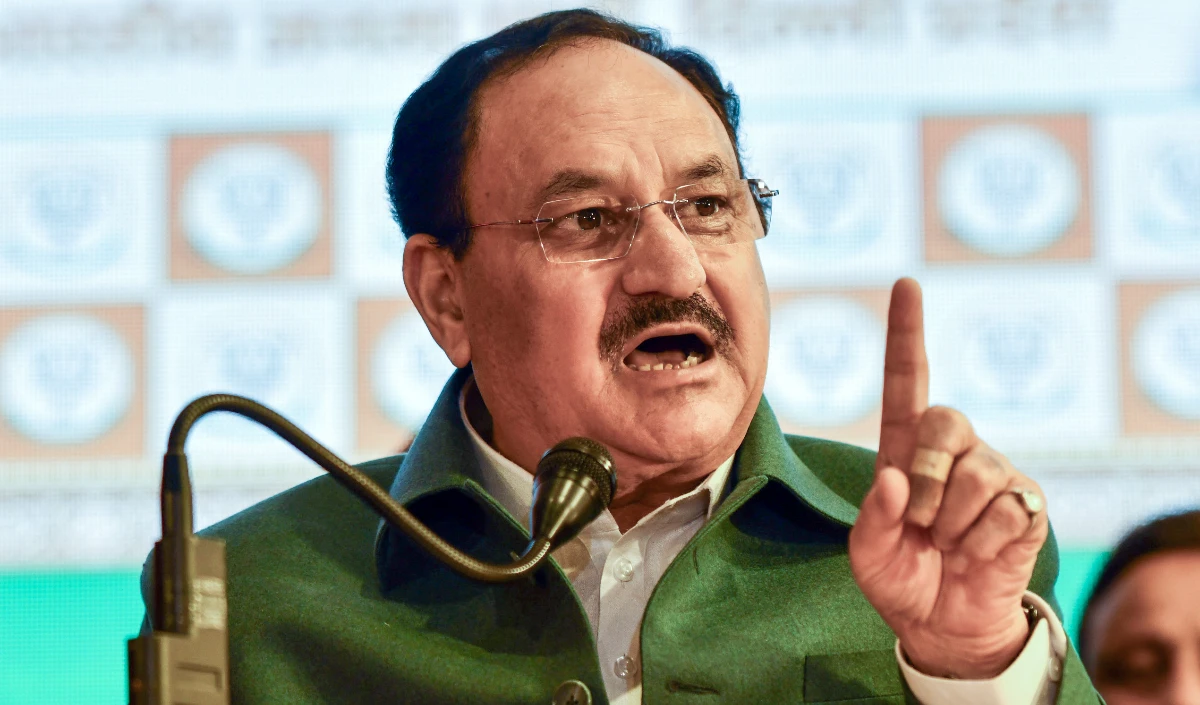Ahmedabad. Union Minister and Bharatiya Janata Party (BJP) President JP Nadda on Sunday claimed that Congress leader Rahul Gandhi has no knowledge of history and does not know that his father (Rajiv), grandmother (Indira) and grandmother’s father ( What attempts did Nehru make to tamper with the Constitution? Nadda said the Congress ruled the country for 65 years and its leaders tried to destroy its basic provisions by tampering with the Constitution. He was speaking at BJP’s ‘Samvidhan Gaurav Abhiyan’.
Recently, he attacked Rahul for using the word ‘Indian State’ in a comment against the Narendra Modi government at the Centre, the BJP and the Rashtriya Swayamsevak Sangh (RSS). Nadda said, ‘Today our Congress leaders say that they are fighting against the Indian State. He has no knowledge of history, nor does he have anything to do with it. He said Rahul ‘just reads’ the speeches assigned to him without understanding their content and context. Rahul had recently said, ‘BJP and RSS have captured every institution of this country and now we are fighting BJP, RSS and the Indian polity.’
Read this also: Deepika Patidar wrote her success story after failing four times, she did not become MPPSC topper just like that
Nadda said, ‘India is preparing to celebrate its 76th Republic Day. In such a situation, we should remember who tampered with the Constitution and tried to destroy its basic provisions. Also remember who protected the Constitution and who worked to protect and underline the ideas of Babasaheb Ambedkar. He said that citizens should be alert and wary of those hypocrites who carry around a copy of the Constitution without reading it.
Rahul often carries a copy of the Constitution with him in his election rallies to attack the BJP. Nadda said, ‘He (Rahul) does not know what his father (Rajiv Gandhi), grandmother (Indira Gandhi) and grandmother’s father (Jawaharlal Nehru) had done. He should know these things. Quoting Ambedkar, he said that even if the Constitution is bad, it can still be made good if the intentions of those implementing it are right. Nadda said Congress leaders were ‘bad’ but BJP leaders are ‘good’ who took steps like abrogation of Article 370 (in Jammu and Kashmir), implementation of ‘one country one tax’ and implementation of Uniform Civil Code. Moving in the right direction.
The BJP president said, ‘When the Constitution was being adopted in 1949, Dr. Ambedkar had said that no matter how good the Constitution is, if the person implementing it is bad, it will fail.’ Nadda said Article 370 and Article 35(A) were implemented by India’s first Prime Minister Jawaharlal Nehru despite Ambedkar’s opposition and these provisions deprived the people of Jammu and Kashmir of the fundamental rights enshrined in the Constitution.
He said that some provisions had created chaos in Jammu and Kashmir, which were repealed by the Narendra Modi government at the Centre. He said, ‘Ambedkar and (Janasangh founder) Syama Prasad Mukherjee had also opposed these provisions. 126 laws passed in our Parliament were not implemented in Jammu and Kashmir, due to which the people there were deprived of many rights.
The Union Minister said, ‘You should understand the difference between bad and good people…When you made Modi the Prime Minister, on 6 August 2019, Modi’s will power and Amit Shah’s strategy helped in abolishing Article 370. ‘
Pointing to the Emergency (1975-77), Nadda said Indira Gandhi tampered with the Constitution and put 1.35 lakh people in jail, ruining many families. Nadda said it was a matter of pride that most of the people jailed during the Emergency were of ‘our ideology’. He cited the 39th and 42nd Constitutional Amendments (passed during the Emergency to limit judicial scope and transfer powers from the states to the Centre), which were implemented by the then Indira Gandhi government.
Nadda said, ‘Indira Gandhi wanted to mislead the country by giving catchy slogans. That’s why he added the words secularism and socialism in the Constitution. Nadda said how the Constitution works under ‘good people’ can be seen from how ‘one nation, one tax’ has been implemented, how the country is moving towards a uniform civil code. How the Other Backward Classes (OBC) Commission was given constitutional status and the Economically Weaker Section (EWS) was given 10 percent reservation.





